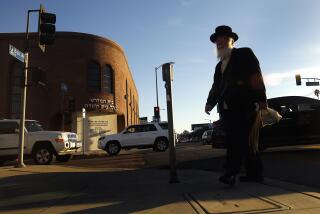Festive Spirit in Air : Jews Mark Sukkot With Food and Fun
SANTA ANA — Hundreds of visitors to one of Orange County’s largest and oldest synagogues were in a festive mood Sunday, and why not?
The holiday calling on Jews to atone for their sins, Yom Kippur, had just passed. And members of Temple Beth Sholom in Santa Ana were celebrating a more lighthearted holiday, Sukkot, which marks the harvest and means “festival of the huts” in Hebrew.
Sukkot comes near the end of about three weeks of holidays in the Jewish faith, which started last month with Rosh Hashanah, the Jewish New Year, and will end next week with Simhat Torah, a celebration of the Torah, or Jewish Holy Scripture.
“It’s fun because we have all the holidays now,” said Elliott Goodman, 10. “We get to skip school. We get to eat. We get to sit under the sukkah.”
At Temple Beth Sholom on Sunday, children could play carnival games, visit the petting zoo and munch on kosher hot dogs. But dozens of children also sat cross-legged and listened to Rabbi Shelton J. Donnell recount the history of Sukkot.
“All of the things we are thankful for are not there because we built or grew them,” Donnell said. “What is the source of all our blessings? God. And this is a time to say, ‘Thank you.’ ”
Sukkot refers to a time 2,000 years ago when farmers would harvest their fields and build the huts for rest and sleep. Sukkah is singular for hut, and the sukkah at Temple Beth Sholom was an outdoor pavilion decorated with palm fronds and plastic fruits and vegetables.
Dozens of children sat under the sukkah, learning of the lulav, Hebrew for festival bouquet, which is made of tree branches and makes the sound of falling rain when shaken. The lulav and a Middle Eastern fruit similar to the lemon, the etrog, are held in both hands and shaken forward and backward, right and left, “to show God is everywhere,” Donnell said.
Andrew Knight, 10, was taken with the bouquet, even though he soon forgot its name. When asked what his favorite part of the day was, he said, “Shaking that thing.”
The temple made extensive efforts to bring other members of the community to the fifth annual festival, and Dan Chambers, a minister at the Church of the Foothills in Santa Ana, accepted the invitation. Chambers brought about a dozen children from his church group to the temple Sunday, the first time they had stepped foot inside a Jewish house of worship.
“It’s not all that different from a Christian church,” noted Chambers, motioning to the pews, pulpit and organ.
Donnell gave the church members a tour of the temple, and showed them the ark, where the Torahs were stored. One ceremonial Torah, which is not read from, survived the Holocaust. “We’re not sure what [Jewish] community it came from, but we know it’s one that no longer exists,” Donnell told the group, which peppered him with questions.
Chambers said it was important for the church group to learn about the Jewish faith. “If we don’t understand our Jewish heritage, we don’t fully understand the Christian religion,” he said, referring to Jesus’ Jewish origins.
Outside, the atmosphere was festive, especially at the petting zoo, which was brought in to create an country fair atmosphere and included goats, ducks sheep, a deer and a llama.
For 5-year-old Greg Keys, the deer and goat were the best animals, hands down. Why? “Because they didn’t bite.”
An odd attraction at the petting zoo were two Vietnamese pot-bellied pigs. Pigs are considered unclean, or not kosher, by devout Jews, and are not eaten.
“Some temples say don’t bring the pigs,” said petting zoo manager Marla Smith, and added, “People ask if they’re kosher. I don’t think so.”
Religious artifacts, jewelry and religious sweat shirts were on sale at the festival, and food and game tickets were four for $1. With the proceeds, the temple’s sisterhood hoped to raise about $3,000 for local charities.
“Yes, [the festival’s] there to make money and pass the money on to our charities,” said Sandy Spitzer, the temple’s vice president of financial development. “But it’s also to get people excited, to give them an education, and to let the children enjoy the holidays.”
More to Read
Sign up for The Wild
We’ll help you find the best places to hike, bike and run, as well as the perfect silent spots for meditation and yoga.
You may occasionally receive promotional content from the Los Angeles Times.






